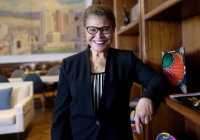Los Angeles’ homeless crisis needs a holistic approach.
Some policymakers and community leaders throw around solutions that can tail wide like wild pitches at Dodger Stadium. Others stick Band-Aids piecemeal on wounds that only continue to flow.
But on the streets of L.A. and Southern California at large, one group emphasizes emergency care at a complete, human, face-to-face level — and, most importantly, preaches individual autonomy. Although stigmas about giving and receiving medical help appear within the homeless population, as well as inside medical centers, UCLA Health Homeless Healthcare Collaborative (HHC) strives to meet people where they are — not where they’re forced to be.
“It is incredibly gratifying to know that I am really seeing someone and seeing them as a whole person,” said Catherine Weaver, medical director of the HHC. “I am able to understand their motives, able to work with them to find something that works well for them.”
In the short time since it was founded, the HHC’s research shows there has been a noticeable decrease in emergency room visits among the homeless population it serves with its mobile clinics. HHC launched in January 2022, and during its first year it recorded a 32% reduction in such cases.
After the HHC received a $25.3 million CalAIM grant in March 2023, the impact of its four on-the-street medical mobile units increased. Encounters with unhoused people to help them more than doubled to 18,314. Outreach encounters — going beyond medical care to include social services, hygiene kits or providing referrals — made up 74.3% of all interactions.
Healing and learning
Much of the HHC’s work tries to ease previous stigma and trauma within the unhoused community across UCLA Health’s geographical span — Santa Monica to Ventura, Santa Clarita and Pasadena. The HHC attempts to create positive interactions with new and repeat patients.
And even as it provides services, it is learning about the population it serves, gathering data and anecdotal insights into the health challenges faced by those who live outdoors, where they face problems as diverse as COVID-19 and exposure and where regular medical care often is unavailable.
Both the research and service delivery are complicated by another cultural dimension of treating the homeless. Many of those who are unhoused are suspicious of authority, including medical authorities, allowing their health issues to fester rather than seeking prompt treatment.
“There’s a fair amount of medical trauma in this community, which can lead to people being a little mistrusting of medical professionals, and understandably so,” said Brian Zunner-Keating, a registered nurse and director of the HHC. “That’s one of the big ones. We have to work to build trust and say, ‘Hey, I don’t know what you faced in the past from medical professionals. But this is the approach we take, and we really want to put you first, and we’re going to respect your dignity. We’re going to respect your autonomy.’”
In addition to building trust, HHC has increased administering labs and dispensing medications. It is now reaching even more people.
Another aspect of its mobile clinics’ daily work is COVID-19 testing. The HHC has seen a consistent decline in positive cases as of February.
“We need a lot of data”
THE UCLA SCHOOL OF PUBLIC HEALTH AND UCLA School of Medicine are conducting retrospective research to examine the further impact of the HHC. At the same time, the HHC is researching patient care and point-of-care assessments with surveys to improve results and communication with patients into 2024 and beyond.
“We need a lot of data,” Zunner-Keating said, “and since we just marked a two-year anniversary, we’re just getting to that point where we have enough data to start delving into some more research.”
One goal is to increase specialty care services. “One thing that still remains incredibly inaccessible to many folks is specialty care,” Zunner-Keating said.
Including specialists — such as podiatrists, cardiologists, OB-GYNs and dermatologists — in the HHC fold could continue to decrease emergency room visits by the homeless.
An increase in specialized doctors could be on the way soon. Meanwhile, the HHC wants to bridge the gap by focusing on women’s healthcare and prenatal care. Weaver sees the addition of OB-GYNs to mobile units as a pressing need.
“There have been plenty of pregnant women who have not had access to appropriate prenatal care, have increased risks to their pregnancy, and there are various reasons for it,” Weaver said. “Whether it be they’ve had bad experiences with the health system in the past, whether their insurance has been challenging for them to work. … It’s a huge gap.”
On the streets, in missions, in shelters
As well as on the streets, the HHC helps the homeless in soup kitchens, recreation centers and the Crete Academy, an elementary school dedicated to unhoused students or students experiencing housing insecurity in South Los Angeles.
The HHC visits the academy monthly so its medical and social professionals can talk with families regardless of their housing situations. It also partners with missions and shelters across L.A., including Hope the Mission, Los Angeles Mission and the People Concern.
The HHC joins with other street medicine teams to help homeless people.
“We’re spearheading an effort to develop a shared communication platform,” Zunner-Keating said. “It will allow us to — through the existing healthcare information exchange networks — be able to see each other’s medical charts, to understand who’s caring for which patients, if there is overlap in certain areas, and how we can coordinate care as best as possible.”
More than 46,000 people are homeless in L.A., according to the 2023 Greater Los Angeles Homeless Count, and more than 75,000 are homeless in Los Angeles County.
“We still need more resources dedicated to helping the unhoused population,” Zunner-Keating said. “We worked really closely with a lot of those housing service providers, and they do amazing work.
“But they’re also stretched very thin when you consider the scope and the breadth of the problem at hand.”























